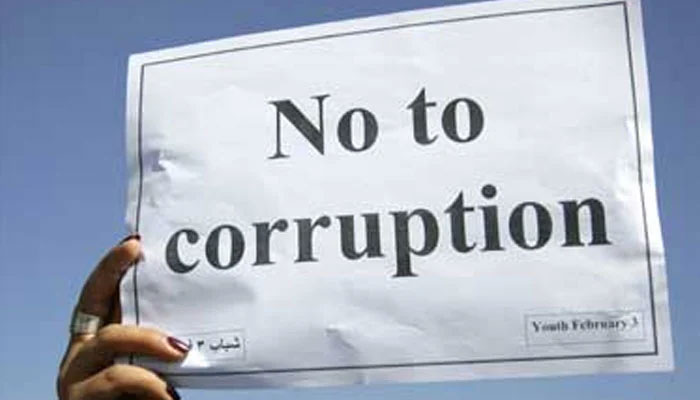People urged to eradicate corruption
DIR: An official said on Friday the eradication of corruption was a collective responsibility and all countrymen should join hands for that. “Promoting a culture of accountability for public officials and discouraging corruption is the need of the hour,” said District Coordinator for Pro-Growth, Arshad Abdali, while talking to the media along with others in connection with the International Anti-Corruption Day.
He said Pakistan must enforce effective governance mechanisms, and access to information laws, and strengthen local governments. Arshad Abdali said the media played a crucial role in eradicating corruption by revealing facts. “We must work together to establish a corruption-free society based on transparency and integrity,” he said.
Giving the background to the day, he said International Anti-Corruption Day was marked every year on December 9 to commemorate the adoption of the United Nations Convention against Corruption in 2003.
He said that the theme for this year was “Uniting the Next Generation Against Corruption,” which highlighted the crucial role of youth in eradicating corruption and promoting integrity.The official said various laws have been enacted, including the Anti-Corruption Act of 1947 and the National Accountability Ordinance to combat corruption effectively in Pakistan.
He said the recent amendments had extended the tenure of the chairman of the National Accountability Bureau (NAB) to three years and limited NAB’s jurisdiction to cases involving corruption of over Rs 500 million.
Arshad Abdali said national and provincial anti-corruption institutions, including anti-corruption establishments in Khyber Pakhtunkhwa, Punjab, Sindh, and Balochistan, were active which were investigating corruption cases to ensure accountability of public officials under respective laws.
-
 Funeral Home Owner Sentenced To 40 Years For Selling Corpses, Faking Ashes
Funeral Home Owner Sentenced To 40 Years For Selling Corpses, Faking Ashes -
 Why Is Thor Portrayed Differently In Marvel Movies?
Why Is Thor Portrayed Differently In Marvel Movies? -
 Dutch Seismologist Hints At 'surprise’ Quake In Coming Days
Dutch Seismologist Hints At 'surprise’ Quake In Coming Days -
 Australia’s Liberal-National Coalition Reunites After Brief Split Over Hate Laws
Australia’s Liberal-National Coalition Reunites After Brief Split Over Hate Laws -
 DC Director Gives Hopeful Message As Questions Raised Over 'Blue Beetle's Future
DC Director Gives Hopeful Message As Questions Raised Over 'Blue Beetle's Future -
 King Charles New Plans For Andrew In Norfolk Exposed
King Charles New Plans For Andrew In Norfolk Exposed -
 What You Need To Know About Ischemic Stroke
What You Need To Know About Ischemic Stroke -
 Shocking Reason Behind Type 2 Diabetes Revealed By Scientists
Shocking Reason Behind Type 2 Diabetes Revealed By Scientists -
 SpaceX Cleared For NASA Crew-12 Launch After Falcon 9 Review
SpaceX Cleared For NASA Crew-12 Launch After Falcon 9 Review -
 Meghan Markle Gives Old Hollywood Vibes In New Photos At Glitzy Event
Meghan Markle Gives Old Hollywood Vibes In New Photos At Glitzy Event -
 Simple 'finger Test' Unveils Lung Cancer Diagnosis
Simple 'finger Test' Unveils Lung Cancer Diagnosis -
 Groundbreaking Treatment For Sepsis Emerges In New Study
Groundbreaking Treatment For Sepsis Emerges In New Study -
 Roblox Blocked In Egypt Sparks Debate Over Child Safety And Digital Access
Roblox Blocked In Egypt Sparks Debate Over Child Safety And Digital Access -
 Savannah Guthrie Addresses Ransom Demands Made By Her Mother Nancy's Kidnappers
Savannah Guthrie Addresses Ransom Demands Made By Her Mother Nancy's Kidnappers -
 OpenAI Reportedly Working On AI-powered Earbuds As First Hardware Product
OpenAI Reportedly Working On AI-powered Earbuds As First Hardware Product -
 Andrew, Sarah Ferguson Refuse King Charles Request: 'Raising Eyebrows Inside Palace'
Andrew, Sarah Ferguson Refuse King Charles Request: 'Raising Eyebrows Inside Palace'




